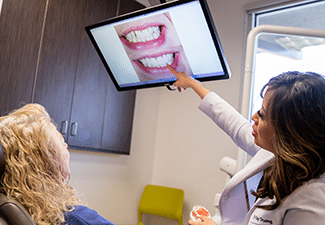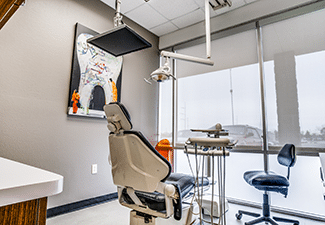 If your gums bleed a little when you brush, your toothbrush bristles may be too hard. Perhaps you’re pressing too hard when you scrub your pearly whites. In many cases, bleeding gums indicate the beginning stage of gum disease, called gingivitis. Other symptoms include redness, tenderness, swelling, and halitosis (bad breath).
If your gums bleed a little when you brush, your toothbrush bristles may be too hard. Perhaps you’re pressing too hard when you scrub your pearly whites. In many cases, bleeding gums indicate the beginning stage of gum disease, called gingivitis. Other symptoms include redness, tenderness, swelling, and halitosis (bad breath).
While poor oral hygiene is the leading cause of adult gum disease (periodontal disease), other factors can contribute to the development of this chronic and progressive condition.
What Increases Risk for Gum Disease?
Age, genetics, certain medications, hormone fluctuations, and systemic diseases can increase risk for gum disease.
The Centers for Disease Control claim that nearly half of Americans over 30 years old have some form of periodontal disease. As adults age, maintaining sound oral health becomes increasingly difficult, which makes us more susceptible to developing diseases. To prevent the onset of gum disease, Dr. Truong recommends continuing dental visits, regardless of age, and brushing teeth twice, flossing once, each day.
Smoking or chewing tobacco increases your risk of developing both gum disease and oral, throat, and lung cancers. Also, using tobacco tends to cause a dry mouth, which leads to an increase in oral bacteria and plaque build-up. Periodontal disease is a bacterial infection of the gum tissue, so if you already suffer with gingivitis, stop smoking now.
Unfortunately, some patients have a genetic predisposition to gum disease. Even with sound dental care habits, these patients can still suffer with bouts of periodontal disease. Dr. Truong can conduct a genetic test of your saliva to screen your proclivity for developing gum disease. Based upon the results, the doctor can begin proactive treatments to prevent gum disease.
Medications, such as asthma inhalers, and hormone fluctuations contribute to an increased risk for developing gingivitis. Even for those with excellent oral hygiene, teens, pregnant women, and menopausal women are prone to gum disease flare ups. In most cases, symptoms of the disease subside when hormones regulate.
Systemic diseases, such as diabetes and heart disease, weaken the body’s defenses and increase the possibility of infections. Patients with diabetes have a greater likelihood of developing gum disease.
Visit Viva Dental for Preventative Gum Disease Care
If you’re experiencing symptoms that may indicate gum disease, visit Dr. Diep Truong. With her expertise, your condition can be treated so that you can enjoy improved oral health. To schedule an appointment at our Dallas dental office, call (214) 337-7800. Also, visit our website to learn more about services, to read our reviews, to obtain patient information. We happily serve new and existing patients in North Oak Cliff, Kessler Park, Duncanville, Grand Prairie, Richardson, Carrolton, Garland, Addison, Farmers Branch, and nearby suburbs.












